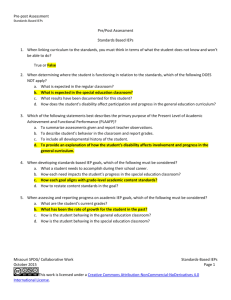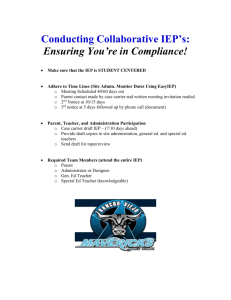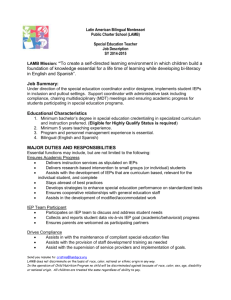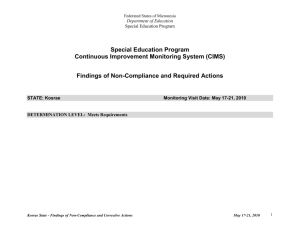General Teacher Interview Questions
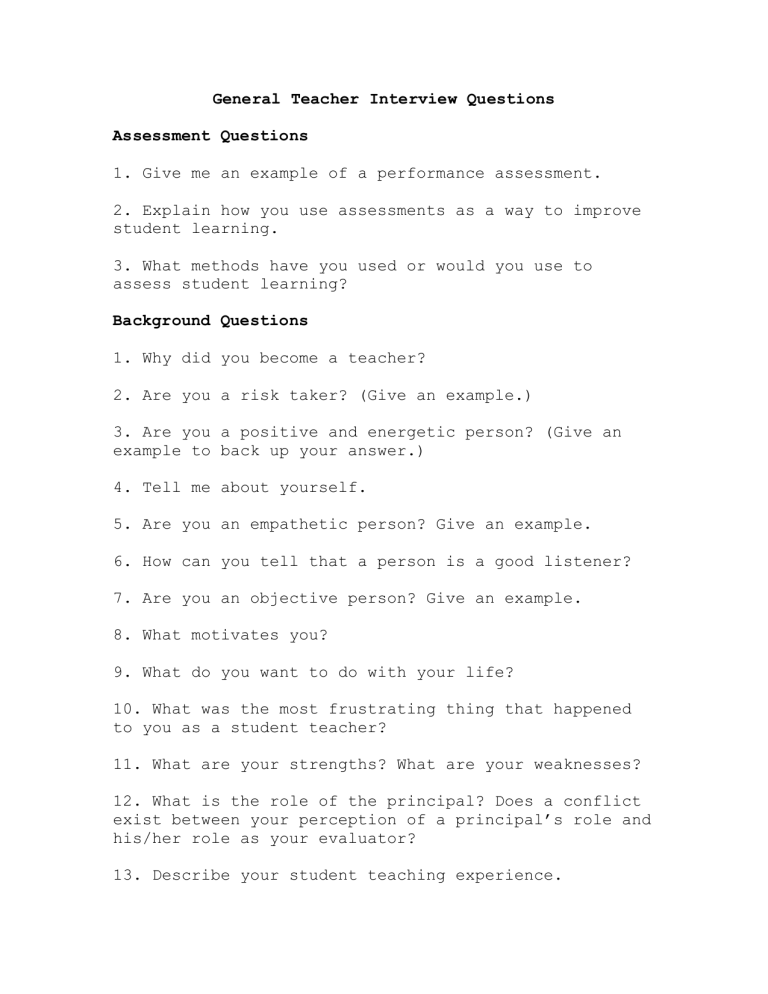
General Teacher Interview Questions
Assessment Questions
1. Give me an example of a performance assessment.
2. Explain how you use assessments as a way to improve student learning.
3. What methods have you used or would you use to assess student learning?
Background Questions
1. Why did you become a teacher?
2. Are you a risk taker? (Give an example.)
3. Are you a positive and energetic person? (Give an example to back up your answer.)
4. Tell me about yourself.
5. Are you an empathetic person? Give an example.
6. How can you tell that a person is a good listener?
7. Are you an objective person? Give an example.
8. What motivates you?
9. What do you want to do with your life?
10. What was the most frustrating thing that happened to you as a student teacher?
11. What are your strengths? What are your weaknesses?
12. What is the role of the principal? Does a conflict exist between your perception of a principal’s role and his/her role as your evaluator?
13. Describe your student teaching experience.
14. During your student teaching, were you ever involved with a situation at school involving racial tension? If so, how did you handle it?
15. What subjects have you taught?
16. Are you patient? Give an example.
17. Do you ever feel angry towards your students?
18. What is your educational philosophy?
19. If you could create the ideal school, what would it be like?
20. Do you like to be challenged? (Give an example to back up your answer.)
21. What do you like most/dislike most about teaching?
22. How do your life experiences prepare you for teaching?
23. What teams and/or clubs did you belong to as a student?
24. What activities would you coach or advise as a member of this staff?
25. Why did you choose to be a teacher?
26. What do you like most about a teaching career?
27. Describe “professionalism.” What does it mean to you?
28. Why should you be hired for this position?
29. Tell us/me about your planning habits. If there a particular format that you use? Do you plan on a weekly basis?
30. Scheduling is tricky and difficult at times. How do you approach conflicts that arise in regard to scheduling with your colleagues?
31. State your educational philosophy. How do you incorporate it into your daily instruction?
32. What are the three most important characteristics of an effective educator/teacher?
33. Why do you feel you are qualified for the position for which you are applying?
34. How would you handle difficult parents?
35. What three words would your students use to describe you?
36. If a student comes into school with a bruise on their face that you did not notice the day before and that student comes up to you and says I need to tell you something but you have to promise not to tell anyone. What do you do?
37. What does it mean to be a teacher?
38. What is the ideal relationship between a teacher and student?
39. What motivates you to achieve your goals to be successful?
40. How would you describe yourself as a team member?
41. How would others describe you as a team member?
Classroom Management Questions
1. If a student said she thought you were the worst teacher she ever had, what would you say?
2. If a student came to you and said, “None of the other students like me,” what would you tell him/her?
3. How do you feel if a student does not meet a deadline?
4. Do you believe you should build rapport with students? If yes, how?
5. How do you feel about noise in the classroom? How do you handle noise in the classroom?
6. How do you organize your classroom?
7. Describe the first five minutes of your class.
8. Give me an example of a rule or procedure in your classroom?
9. You have a child with autism in your classroom who has a hard time with transitions. How do you accommodate this child?
Discipline Questions
1. Some people say you should demand respect. Do you agree or disagree?
2. It is the first day of class, you are writing something on the board and a paper wad hits you in the back, what would you do? Later the same day, if all the students drop their pencils, what do you do?
3. How do you handle a child who seems gifted, but is a discipline problem?
4. Describe your discipline plan.
5. How do you curb student misbehavior?
6. Describe a troubled student and how you helped him/her.
Pedagogy Questions
1. What will you do to engage parents? How will you get them actively involved in their child’s education?
2. How do you give your students recognition? Do you think a student can have too much recognition?
3. What are various reading strategies you use?
4. How would you incorporate math into your curriculum
(for non-math teachers)?
5. What strategies would you use to enhance students’ writing skills?
6. What are various vocabulary strategies you use?
7. What’s the difference between a good and a great teacher?
8. How would you handle making a difficult phone call to a parent?
9. Explain how you use differentiated instruction in the classroom?
10. Describe two to three instructional tools you need in the classroom?
11. What role do standards play in your classroom?
12. Describe your teaching style.
13. Describe your ideal lesson.
14. Have you team-taught? What’s your opinion on it?
15. Describe a teaching strategy you used to maximize the learning potential of all students.
16. How would you decide what should be taught in your classroom?
17. Describe any multicultural, gender fair classroom practices you have used in the past and how you would ensure equality among your students.
18. What is your philosophy on homework?
Professional Development Questions
1. What are your goals for next year?
2. What is the last book you read?
3. How do you keep abreast of your field?
4. What will you be doing in five years?
5. What is the most significant professional development you have received?
Student Learning Questions
1. How do you use technology to enhance student learning?
2. How would you rank these in importance and why?
Planning, discipline, methods, evaluation.
3. How do you encourage students to learn? Can a student be forced to learn?
4. Do you make learning fun? Give an example.
5. How do you encourage students to be active in learning?
6. How do you communicate your student learning expectations?
7. How do you know that your students are learning?
Secondary - Career and Technical Education
1. How do you keep abreast of current business trends?
2. Give an example of a lesson or unit that teaches one or more employability skills.
3. How would you incorporate leadership into your classroom?
4. What are the most desired skills employers want to see in their new hires? How do you as a teacher address this?
5. How will you connect your curriculum to the realworld?
Secondary - Mathematics
1. What manipulatives do you use? How effective are they?
2. Give an example of a topic (i.e. fractions) that students tend to have conceptual difficulties with.
Now teach me this topic (and show me how you would handle dealing with the conceptual problems).
Secondary - Science
1. What is your philosophy on teaching science to elementary kids? Teenagers? Economically disadvantaged kids?
2. Why do you want to be a science teacher?
3. What Science organizations are you involved with (as a member or other)?
4. Tell me about a current science event that you have read about this week? How would you use this in the classroom?
5. In which field of science do you feel particularly strong? Explain.
6. In which field of science do you feel the least knowledgeable/competent in? Explain.
7. If you were hired to teach starting this September, how would you go about setting up your science program?
8. What science curriculum do you have experience with?
What do you like or dislike about them?
9. What role do you believe that the adopted Science book should serve in your classroom?
10 Where do you find resources other than the Science book inorder to keep your students current on the constantly evolving knowledge of science?
11. What do you understand the inquiry method to be in science?
12. Why would or would not you use lab groups or lab partners in your class? How would your establish lab groups/lab partners (what criteria would you use)?
13. How would you evaluate lab groups/partners to be to know that each student is learning and participating?
14. How would you integrate technology into your science teaching? How would you integrate math?
Reading? Writing? Social Studies?
15. How will you make your subject(s) relevant to the students?
16. How important is hands-on lab and inquiry lessons?
Secondary - Special Education
1. What do you believe are the three major challenges facing special education today?
2. A special education teacher must be both organized and flexible. Give examples of ways that you have demonstrated both of these characteristics.
3. What does “teamwork” mean to you as a special education teacher?
4. How would you communicate with the parents of your students? What issues would prompt you to contact them?
5. How would you delegate responsibilities to a paraprofessional and monitor his/her performance?
6. How do you evaluate your own teaching skills to insure continual growth and refinement?
7. Paperwork/documentation is a strong concern in the area of special education. How will you manage those demands, in addition to your teaching responsibilities?
8. Describe the components of a reevaluation report.
9. Describe the main components of an IEP and what should go into each section.
10. One of the challenges for a special education teacher is documentation. How would you collect and record necessary data for the students’ Manifestations,
IEPs, and etc.?
11. Describe how you would determine and deliver appropriate individualized instruction to the students.
12. What types of assessment have you used? What assessments would you use to document student learning and plan for future instruction? How would you use assessment to develop and modify IEP goals?
13. Unfortunately, there are some negative elements that you will encounter within the profession. How will you interact with those individuals so they will not alter focus?
14. To what specific area of special education are you most attracted and why?
15. Aside from your coursework, what additional reading have you done that is pertinent to your field?
16. The US Department of Education now recommends that schools use the RTI (“Response to Intervention” or
“Response to Instruction”) Model rather than the
Discrepancy Model to identify children with specific learning disabilities. Tell us what you know about this model.
17. How do you integrate technology into your teaching?
Have you had any experience with specific technology to support the needs of special education students?
18. Given a wide range of ability levels in a classroom, how do you assure compliance with each child’s IEP?
19. Have you had any experience supporting students with IEPs in the regular classroom? How have you or would you do this?
20. What are your views on inclusion versus selfcontainment of special education students?
21. What would you do to address inclusionary support with the general education staff? How would you deal with a general education teacher who refused to honor
IEP modifications for the special education students in their classrooms?
22. A general education teacher is concerned that a child with an IEP does not belong in her classroom due to behavior problems. How do you respond?
23. What do you feel is the best service delivery model for special education students?
24. How familiar are you with the IDEA guidelines for special education? What are some of the timelines related to IEPs?
25. Explain the impact of the Gaskins’ settlement on special education in the public school setting.
26. Describe both a successful and a challenging collaboration experience with a general education teacher.
27. How will you coordinate/facilitate instruction to meet Adequate Yearly Progress goals?
28. Why do you want to work in this district/IU? Why should we hire you? What distinguishes you from the other candidates who applied for this position?
Secondary - Social Studies
1. Have you collaborated with another teacher in the same grade-level, but a different subject, e.g.
Language Arts? If so, please describe this.
2. Do you make it a habit of watching the news or reading newspapers or news magazines? Do you watch local or national news programs?
3. Do you consider yourself well aware of current world issues and politics?
4. How would you integrate a school wide curriculum on a social issue such as gay rights into your classroom
(e.g. The Laramie Project)?

